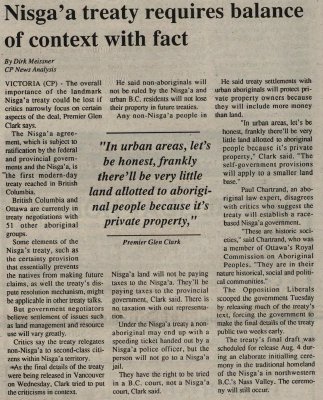"Nisga'a treaty requires balance of context with fact"
- Publication
- Tekawennake News (Ohsweken, Ontario), 29 Jul 1998
- Full Text
- Nisga'a treaty requires balance of context with factBy Dirk Meissner, CP News Analysis
VICTORIA (CP) -The overall importance of the landmark Nisga'a treaty could be lost if critics narrowly focus on certain aspects of the deal, Premier Glen Clark says.
The Nisga'a agreement, which is subject to ratification by the federal and provincial governments and the Nisga'a, is the first modern-day treaty reached in British Columbia.
British Columbia and Ottawa are currently in treaty negotiations with 51 other aboriginal groups.
Some elements of the Nisga's treaty, such as the certainty provision that essentially prevents the natives from making future claims, as well the treaty's dispute resolution mechanism, might be applicable in other treaty talks.
But government negotiators believe settlement of issues such as land management and resource use will vary greatly.
Critics say the treaty relegates non-Nisga'a to second-class citizens within Nisga'a territory. As the final details of the treaty were being released in Vancouver on Wednesday, Clark tried to put the criticisms in context.
He said non-aboriginals will not be ruled by the Nisga'a and urban B.C. residents will not lose their property in future treaties.
Any non-Nisga'a people in Nisga'a land will not be paying taxes to the Nisga'a. They'll be paying taxes to the provincial government, Clark said. There is no taxation without representation.
Under the Nisga'a treaty a nonaboriginal may end up with a speeding ticket handed out by a Nisga'a police officer, but the person will not go to a Nisga'a jail.
They have the right to be tried in a B.C. court, not a Nisga'a court, Clark said.
He said treaty settlements with urban aboriginals will protect private property owners because they will include more money than land.
"In urban areas, let's be honest, frankly there'll be very little land allotted to aboriginal people because it's private property," Clark said. "The self-government provisions will apply to a smaller land base."
Paul Chartrand, an aboriginal law expert, disagrees with critics who suggest the treaty will establish a race-based Nisga'a government.
"These are historic societies," said Chartrand, who was a member of Ottawa's Royal Commission on Aboriginal Peoples. "They are in their nature historical, social and political communities."
The Opposition Liberals scooped the government Tuesday by releasing much of the treaty's text, forcing the government to make the final details of the treaty public two weeks early.
The treaty's final draft was scheduled for release Aug. 4 during an elaborate initialing ceremony in the traditional homeland of the Nisga'a in northwestern B.C.'s Nass Valley. The ceremony will still occur.
- Creator
- Meissner, Dirk, Author
- Media Type
- Text
- Newspaper
- Item Type
- Clippings
- Publisher
- Tekawennake News
- Place of Publication
- Six Nations of the Grand River, ON
- Date of Publication
- 29 Jul 1998
- Subject(s)
- Personal Name(s)
- Clark, Glen.
- Corporate Name(s)
- Government of British Columbia ; Nisga'a Lisims Government ; Government of Canada.
- Local identifier
- SNPL005083v00d
- Language of Item
- English
- Geographic Coverage
-
-
British Columbia, Canada
Latitude: 48.43294 Longitude: -123.3693
-
- Creative Commons licence
 [more details]
[more details]- Copyright Statement
- Public domain: Copyright has expired according to Canadian law. No restrictions on use.
- Copyright Date
- 1998
- Copyright Holder
- Tekawennake News
- Contact
- Six Nations Public LibraryEmail:info@snpl.ca
Website:
Agency street/mail address:1679 Chiefswood Rd
PO Box 149
Ohsweken, ON N0A 1M0
519-445-2954




